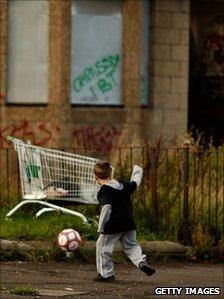Scottish poverty levels 'not improving'
- Published

About 250,000 Scottish children live in low income households
Scotland is facing its "most difficult" challenges in tackling poverty in years, campaigners have warned.
The Assembly for Tackling Poverty, which is due to meet in Glasgow, said levels of poverty in Scotland have "not been improving for a number of years".
It said about 250,000 Scottish children were living in low income households.
The assembly will hear from community and voluntary organisers, faith groups, trade unions, academics and policy makers.
The groups have warned that the impact of proposed changes to the welfare system "are likely to make the situation even worse for many people", with child poverty increasing and public and voluntary services used by people living on low incomes hit by cuts.
The cost of fuel and food is also set to rise this year - putting more pressure on those on low budgets.
The assembly is part of a four-year project supported by the Big Lottery Fund in Scotland.
It aims to support community and voluntary organisations to become more involved in developing anti-poverty policy.
A spokesman said it was now "crucial" to find solutions to the causes of poverty.
Challenges ahead
Peter Kelly, director of the Poverty Alliance, which organised the assembly, said: "The assembly is a unique event: over these two days more than 500 people will gather to hear evidence about the reality of poverty in Scotland.
"The experience of those living in poverty will be at the centre of the debates that take place.
"The challenges we face this year are the most difficult that many of us can remember. In this context, the debates and the solutions identified at the assembly are more important than ever."
He added: "The involvement of people with direct experience of poverty in policy making is not a luxury but is essential if we are to find the right solutions in these difficult times. We just hope that government, north and south of the border, are listening."
- Published19 October 2010
- Published28 August 2010